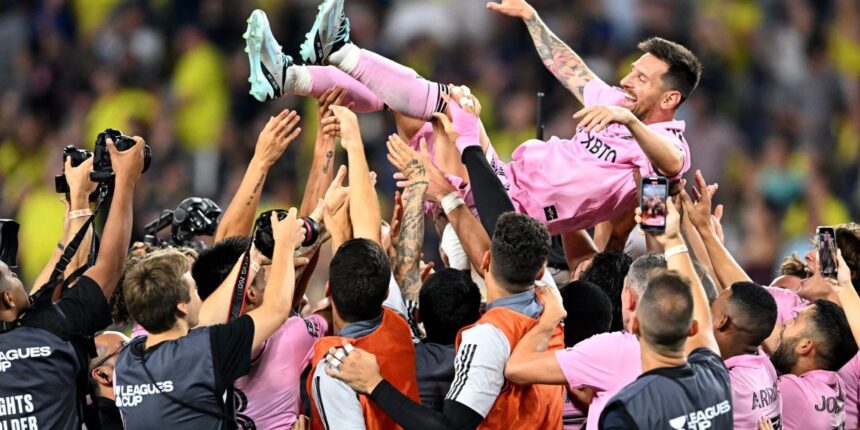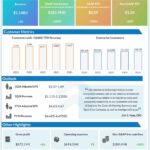
The Messi effect is here and it’s starting to look massive. Apple CEO Tim Cook is thrilled with it, saying he “could not be happier with how the partnership is going,” while Inter Miami owner Jorge Mas is beaming as his club’s Instagram has grown to 14 million followers, more than any NFL, NHL or MLB team. And if you want to catch Lionel Messi in your town, be prepared to pay upwards of $600 for a ticket—maybe double that.
The exact numbers are hard to pin down because much of the data is either not publicly available, or not available yet. But it is starting to look as if Messi’s new deal with Major League Soccer’s Inter Miami, for between $50 million to $60 million and including revenue sharing agreements with league sponsors Apple and Adidas, is just the tip of the iceberg. (The arrangements with Apple and Adidas are meant to reflect the full amount of money Messi brings into the league and its sponsors.)
Apple, the broadcast partner for MLS, has a streaming platform dedicated to the league, which gained 300,000 subscribers in July, the same month Messi announced he would be joining Inter Miami, bringing its total to one million, according to Sports Business Journal. MLS Season Pass, as it’s known, costs $99 a year, suggesting that a 300,000 subscriber increase is bringing in $29.7 million. This is not a straightforward calculation, however, owing to promotions with T Mobile and LG, and MLS season ticketholders get the service for free. MLS currently has an estimated 420,000 season ticketholders, according to World Soccer Talk, but it’s clear that a lot of money is coming in. Earlier this month, Mas said subscribers to MLS Season Pass had more than doubled since Messi joined the MLS, suggesting it’s now around 1.4 million subscribers.
MLS did not provide a specific number for MLS Season Pass subscribers, saying only that they have more than doubled since Messi joined the league. It did not respond to a question regarding leaguewide season ticket holders.
Streaming is not the league’s only distribution channel, either. In a savvy move, MLS hasn’t just focused on live broadcasts but also on how it packages and distributes highlights on social media. Other sports leagues often have to limit the geographies in which people can view the highlights they post to social media, but the global nature of the MLS broadcasting deal with Apple doesn’t have the same restrictions. For example, Messi’s first goal for Inter Miami against Cruz Azul got more than 214 million social media views and around 14 million impressions, according to the analytics company Zoomph. This reach, previously unthinkable for MLS, illustrates the extent to which Messi’s presence is a boon for media partners and advertisers alike.
Messi’s impact extends to live viewership as well, as fans flock to stadiums around the country for the chance to see him play in person. With virtually every Inter Miami game already sold out, fans have to rely on the secondary market, notorious for upcharging buyers. Prices for tickets to Inter Miami games have risen 1,700% on the resell market, according to CNBC. Tickets for Inter Miami’s game against the New York Red Bulls on Saturday run from $425, in the corner of the upper deck, to a package of four VIP tickets going for just north of $50,000, as listed on Vivid Seats at the time of publication. A few weeks ago, as Messimania swept MLS in late July, the Chicago Fire reported gameday revenue for its home game against Inter Miami that equaled the income from all its other home games combined, according to a report from The Athletic.
In just two months since Messi has joined the league, he has generated at least $265 million in primary ticket sales, in addition to the new MLS Season Pass subscriptions mentioned above, according to Fortune’s calculations. The complete picture of his financial impact is likely much higher given that the number of jerseys sold and tickets resold on the secondary market are not yet known, if they ever will be. (Note: To calculate the estimated primary ticket sales, Fortune used an average ticket price of $487, as reported for Messi’s Inter Miami debut, assumed a sold out crowd of 19,100 for 10 home games, and 29,220 for 10 away games derived from the mean capacity of all the stadiums where Inter Miami will play before the end of the season, as listed on their respective websites.)
The huge numbers of fans filling MLS stadiums translate to more than just gate receipts. They also buy concessions, parking passes, and more than anything else merchandise. That means Messi jerseys are likely being worn by a 10-year-old in a city near you at an MLS game. Inter Miami and Adidas, the MLS’s shirt sponsor, said in July that orders for number 10 Messi jerseys are backlogged through October.
A Messi Inter Miami jersey is the most expensive on Adidas’ website, costing a staggering $180, or double the $90 that fans would have to shell out for Messi’s Argentina jersey from his World Cup-winning campaign in December. Adidas called the demand “unprecedented” and ESPN reported it was the fastest-selling jersey in the first 24 hours of release ever recorded. To put that in perspective, Argentina is one of the world’s great soccer nations, and has worn its “Albiceleste” white and sky-blue stripes for decades, while Miami’s deco-style pink has only been worn for five years, as the club backed by Mas and David Beckham has won the nickname of “The Herons.”
Messi’s contract, similar to that of his new partner Beckham, includes an equity stake in Inter Miami, according to Sportico. His share of the team could already be worth more than it was when he signed. Mas said he believed Inter Miami’s revenues would double within the first year of signing Messi. In 2022, the team had around $54 million in revenues, meaning that Mas’ projection would see the club bring in around $108 million this year. Mas also said he expects the team’s valuation to rise to as high as $1.5 billion over the same time frame. Institutional investors seem to be buying Mas’ excitement. Earlier this month, investment firm Ares Management pumped another $75 million into Inter Miami, bringing its total investments in the team to $225 million since 2021.
Simply put, Messi is box office, and right now, so is soccer in America.








